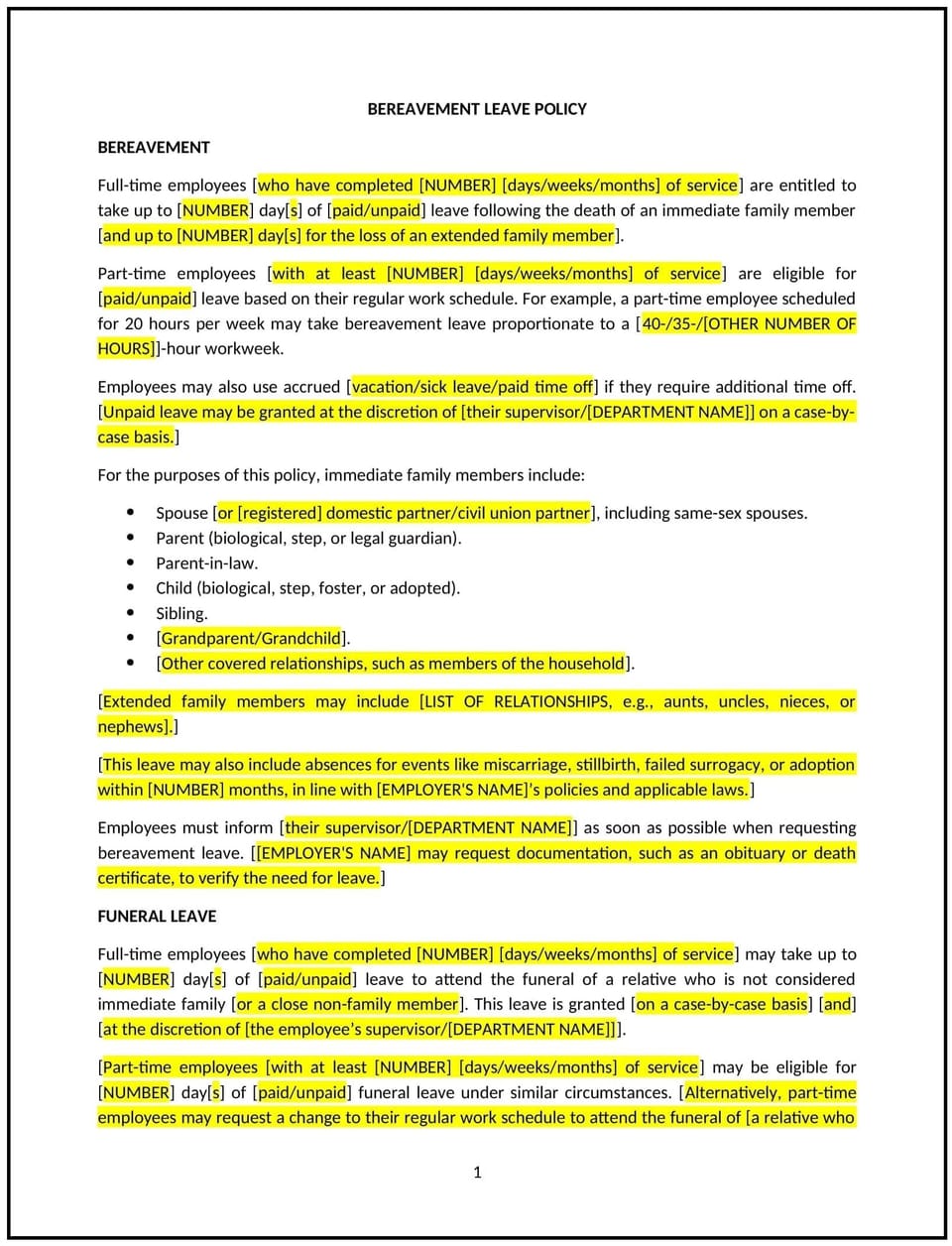Bereavement leave policy (California): Free template

Bereavement leave policy (California)
In California, a bereavement leave policy provides businesses with guidelines for managing employee absences following the death of a family member or loved one. This policy helps businesses support employees during difficult times while ensuring operational needs are met and compliance with California labor laws is maintained.
This policy outlines eligibility criteria, leave duration, and procedures for requesting bereavement leave. By implementing this policy, California businesses can foster compassion and empathy while maintaining consistency.
How to use this bereavement leave policy (California)
- Define eligibility: Specify which employees qualify for bereavement leave and the types of relationships covered, such as immediate family members or dependents.
- Establish leave duration: Clearly state the amount of leave provided, whether paid or unpaid, and any conditions for extension.
- Outline request procedures: Provide instructions for requesting bereavement leave, including notice requirements and documentation, such as an obituary or death certificate.
- Address state-specific considerations: Reflect California laws that govern bereavement leave, including any recent legislative updates.
- Communicate expectations: Clarify the process for returning to work and any accommodations available during the transition.
Benefits of using this bereavement leave policy (California)
This policy offers several advantages for California businesses:
- Promotes empathy: Demonstrates the business’s commitment to supporting employees during times of personal loss.
- Supports compliance: Reflects California-specific requirements for bereavement leave and ensures lawful implementation.
- Enhances morale: Provides employees with the flexibility and understanding they need, fostering trust and loyalty.
- Encourages consistency: Establishes clear guidelines for handling bereavement leave requests, reducing ambiguity.
- Protects operational continuity: Provides a structured process for managing workloads during employee absences.
Tips for using this bereavement leave policy (California)
- Reflect California-specific laws: Include any state requirements for bereavement leave, such as those covering family relationships and leave duration.
- Train managers: Provide guidance on handling bereavement leave requests sensitively and in compliance with the policy.
- Document requests: Maintain records of leave requests and approvals to support consistency and transparency.
- Offer flexibility: Consider accommodating additional leave requests based on unique circumstances or cultural considerations.
- Review regularly: Update the policy to reflect changes in California laws, workplace needs, or employee expectations.
Q: How does this policy benefit the business?
A: This policy supports employees during times of loss, fosters a compassionate workplace culture, and aligns with California labor laws.
Q: What relationships qualify for bereavement leave under this policy?
A: Qualifying relationships typically include immediate family members, dependents, or others specified in the policy, in accordance with California guidelines.
Q: How does this policy support compliance with California laws?
A: The policy incorporates California-specific requirements for bereavement leave, supporting fair and lawful practices.
Q: What documentation may employees need to provide when requesting bereavement leave?
A: Employees may be asked to provide documents such as an obituary, death certificate, or funeral program, as outlined in the policy.
Q: How can the business accommodate additional bereavement leave requests?
A: The business can consider extensions on a case-by-case basis, taking into account operational needs and the employee’s circumstances.
This article contains general legal information and does not contain legal advice. Cobrief is not a law firm or a substitute for an attorney or law firm. The law is complex and changes often. For legal advice, please ask a lawyer.


